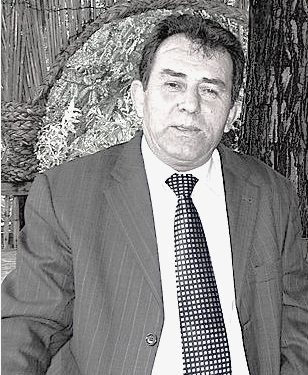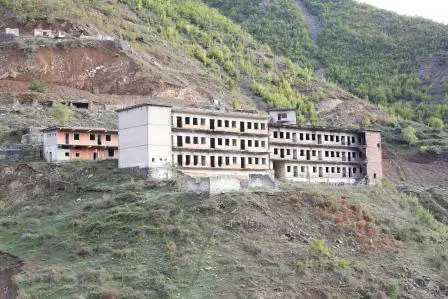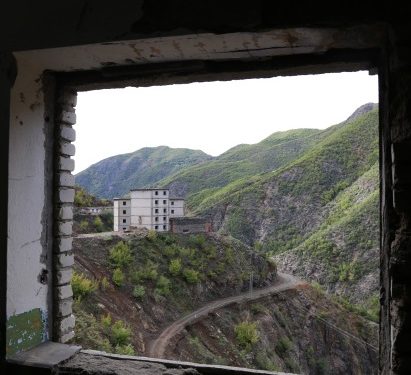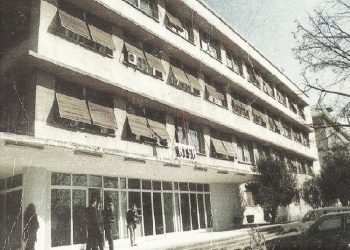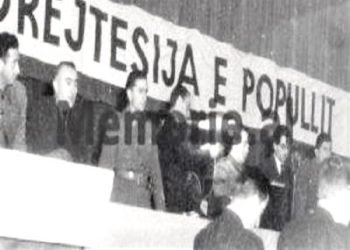By Shkëlqim ABAZI
Part Ten
SPAC
The Grave of the Living
Tirana, 2018
(My memories and those of others)
Memorie.al / Now in my old age, I feel it is my duty to tell my truth, just as I lived it. To speak of the modest men who never boasted of their deeds and of others whose mouths the regime sealed and buried them in nameless pits. In no case do I take it upon myself to usurp the monopoly of truth or to claim laurels for an event where I was a random witness, even though I tried with all my heart to help my friends, who politely and kindly avoided me: “Brother, open your eyes… don’t get involved… you only have two months and a little left!” A worry that clung to me like an amulet, from the morning of May 21, 22, and 23, 1974, and even followed me in the following months until I was released. Nevertheless, everything I saw and heard those three days, I would not want to take to the grave.
Continued from the previous issue
Every eight hours, the jackhammer roared at the face of the gallery, the mines thundered, ore was peeled off, arming was done, then the shift changed the shift, and the work went on endlessly. Woe to whoever did not meet the quota, as they were forced to stay for two shifts; whoever objected ended up tied to the beams and, after that, one month in solitary. The first shift started at seven, the second at three, and the third at eleven. The first and second could be tolerated somewhat, but the third was a live burial; you started in the dark, you immersed yourself in the dark, and you did not know if you would see the sun again.
The daily routine: work, roll call, sleep, roll call again, and work; and weekly: the first, second, and third shifts; plus the checks at the entrance-exit gate, the sudden ones in the dormitory – add to that the violence and stress – it reduced us to sleepwalking mechanisms. For any reason, when you failed to meet the quota, or showed clumsiness from mortal fatigue, and inadvertently violated the regulations, the consequences were unimaginable. To endure these stresses required nerves of steel, the will of an idealist, and a titanium character.
I met all sorts of characters, torchbearers who consciously sacrificed to illuminate the path for everyone, and those who adapted to evil, finding no motivation to react. I met pessimists who self-mutilated to escape the gallery; they willingly submerged their foot or hand under the wheels of the multi-ton wagon; or, if someone lacked the courage, they asked this “favor” from a friend.
I met individuals who offered you the pickaxe to cut off a finger or a toe, and if you refused, they looked at you askance, like an enemy. I met pehlivanë (charlatans/wrestlers) who masterfully played the crazy person with acting skill, so much so that they fooled even the medico-legal commissions; the case of Dhimitër Pango remains an example. Some entered the role willingly and, unintentionally, ended up crazy. But I also met idealists with an iron will, who faced the trials like stoics and guided others.
In this chapter, I do not aim for this argument, but I mentioned them briefly to emphasize that even the slightly differentiated treatment did not prove salvational for the mass of political prisoners who worked in the mines. Let’s talk about the galley slaves, how they were treated and what they actually benefited? The number one concern of the Albanian has always been bread. When we sit at the table, we do not associate the meal with eating; we don’t say we will have breakfast, lunch, a snack, or dinner, but simply: “We will eat bread.” So, at all times: “We will eat bread!”
Even in the old days, when two villagers met in the market, after inquiring about health and the number of family members, the subsequent question would be: “Have you secured the year’s bread?” and the answer: “Praise God, it was a good year, I have for nine, for six, or for three!” or in the worst case: “The weather didn’t help us, I will sell the livestock to buy crops!”
Unfortunately, this mentality has changed little even today. So, I will start with the bread. The miners were given nine hundred grams per day. A lot, by today’s standards. When today’s youth hears that an individual consumed this amount and did not feel full, they will either not believe us or mock us: “What did you have, a stomach or a gizzard?!”
The answer is easy: “Man does not have a gizzard, but a stomach!” But even a pig does not have a gizzard, yet it gorges as much as you throw at it and does not get full! Well, communism turned us into pigs, not just the convicts, but the entire people, except for a privileged minority. Instead of a stomach, they installed a sack in us that never filled up, no matter how much you threw into it. That’s why even nine hundred grams of bread did not satisfy us.
In the cauldron of the underground workers, the same dishes were cooked, with almost the same assortments, almost the same vegetables, divided according to the seasons, but after repeated complaints, checks became more frequent, although abuses were never eliminated. The soup was a slightly thicker liquid, supposedly with more added fat than in Reps; one might even catch sight of a fragment of meat, yet it remained inedible, but willingly or unwillingly, we would swallow it, because it was the only source of survival.
In the morning, they only gave us soup. For lunch, besides the soup, a ladle of pilaf was added, usually small pasta, sometimes even rice, naturally with meat (forty grams were written on paper), but you rarely encountered it in the bowl; nevertheless, you could smell its aroma, as it was full of grime and insects.
In the evening, they gave us tea, slightly sweeter, meaning drinkable, and twenty grams of white cheese; when this was missing, ten grams of cottage cheese, and in times of crisis, which lasted all year, they replaced it with apple jam, and in special cases, even fig jam. If they had given us what was written, we might have been satisfied, or almost satisfied, because it was a handful more “fodder” for the stomach turned into a cave, but they did not give us the full amount. Since work in the mines was in shifts, cooking was non-stop.
The first shift enjoyed a normal regime: soup for breakfast, soup and pilaf for lunch, tea and a slice of cheese for dinner. The schedule was somewhat complicated for the other two shifts, because the beginning and end of work did not coincide with mealtimes, but they solved it in an original way: for the second shift, they gave the dinner tea in the morning, the breakfast soup at noon, and the lunch soup and pilaf in the evening. This formula was more or less practiced for the third shift as well, except that the time was shifted.
In addition to these “privileges,” the underground workers benefited from some extra odds and ends; a bar of Rrogozhinë soap, with a rotten smell of glycerin and cottonseed, that caused nausea and gut-wrenching pain; only after vomiting what you had in your stomach could you calm down. When these were missing, they replaced them with caustic soda, which caused itching and stripped the skin.
Underground workers faced health-damaging factors every second. Thus, they were given antidotes to somewhat neutralize the effects, as was done for some professions with the same harmfulness, such as: metallurgists, employees of melting plants, silica bakers in glass factories, laborers of manipulation and distribution of toxic materials, employees of gunpowder and tritol production, etc.
However, they also enjoyed additional benefits, such as slightly higher wages, retiring at fifty, if they escaped death and reached the age; some benefited from a free camp ticket to the workers’ “hangars,” a decoration with the bearded likenesses of Marxist-Leninists or the portrait of the great Enver, a certificate of honor, or praise, which upon the recipient’s death, remained for the heirs to use as a carte blanche for expected benefits, etc.
These incentives acted in reverse for the imprisoned miners. A salary of one hundred and eighty old ALL; earlier retirement, with most in the pit opposite; as soon as the chicken plague struck in China, it also affected us there; they would send us to the “rest camp,” in… Burrel or to the “special residences,” where we would bore ourselves and rest our bones… until our soul left us. “Decorations” were given to us without ceremony: a bullet to the back of the head and eternal rest, at the altar of the nameless “martyrs.”
The certificates of honor and praise with noble appearance; a piece of cardboard with the inscription “Department of Internal Affairs X, or No. Y” and continued with the pompous name, but since there were many, additions were made: CERTIFICATE OF HONOR “Surveillance,” CERTIFICATE OF HONOR “Processing,” CERTIFICATE OF HONOR “Cooperation.” Naturally, these were “donated” according to contributions and merits; the operative considered it appropriate to raise the recipient to the pedestal, adding the bullet-decoration. Then the series was extended with “CERTIFICATES OF PRAISE” with the fantastic name: “DOSSIER.”
The dossiers specified: “Investigative,” “Judicial,” “Prison,” and “Post-Prison,” with an effect until the grave for the recipient and with undeniable testamentary value for the heirs, ensuring them, besides eternal happiness, protection with “bodyguards”… in labor camps or in the Elysian Fields of Myzeqe.
The Bait-Law and Communist Malice
The incentive mechanisms did not yield the expected result, so in 1971; they invented the key that opened the doors of ambition. On the initiative of the People’s Assembly, they concocted the lumpen law, the most malicious ever approved during the communist regime concerning political prisoners. Through the clauses of this lumpen law, convicts who allegedly achieved high results in work were recognized the right to receive a financial reward, from one hundred and seventy to seven hundred old ALL per month and from one to ten points, seven days of reduction, which in the most ideal case reached eighteen days a year.
This bait-law was somewhat similar to the decrees of the Presidium of the People’s Assembly: “Hero of Labor,” after death, or “Vanguard Worker, working for the first decade of the twenty-first century,” when the claimant might die the next day and the prophecy would be left unfinished. If you calculated the drudgery to secure the expected benefits, the gain was not worth the effort to enter the dance. But this is exactly where the plague’s trick was hidden, which made even the laziest ones leave their bones in the galleries!
The cunning law initially enchanted even the spies, who sought out the mine through connections. But when many miserable people were left under the massive mountain rocks, others filled the hospital with T.B.C. (tuberculosis) disease, and others still hobbled along, mutilated, the game was up. Nevertheless, some entered this spiral, motivated by different reasons, they rejoiced at the legal space, which supposedly allowed them to earn some money with grueling work and to help their relatives in internment, where they fared worse than us. Naturally, a modern mind does not accept the logic: “from the grave pit, to help the free people, in communist paradise”!
Because this implied a modern resurrection of Konstandin, who rises from the grave, brings Doruntina to his mother’s door, and returns to the grave. The grave where the prisoners were crammed was never cracked open for them to reach the threshold of their home, but money did come out of that grave and added to the lives it awaited. To all the anonymous heroes who sacrificed in the name of life and surrendered to the grave of the grave, I would like to dedicate a special respect, but there were those who hoped to get out a little faster, even though they had been sentenced for a long time, someone to spend their old age near grandchildren, another to contribute to the upbringing of children, and the most optimistic, to start a family, but they chose to scramble in the convoluted labyrinths of this provision.
To turn the dream into a nightmare, they even gave their soul, to benefit from the wolf-like space. However, the majority did not succeed, either due to health reasons, or major reasons (they were left under the rocks of the mountain, were affected by diseases caused by air loaded with dampness, with germs and toxic gases, which brought them death slowly), they stopped the greed, but even if they did succeed, they were released as cripples, useless to anyone, and instead of rejoicing at their freedom, they prayed to God to shorten their days sooner.
Every enthusiast calculated a maximum of eighteen days-reduction per year, times so many years, we gain so many years, months, or days, and continued rocking in the cradle of hope. There were those who bought days with money; the money they earned with grueling work, they threw to others, in exchange for day-reductions, and they rejoiced at every hour, even though in the end they were disappointed; the days gained with work were erased by re-sentencing, and the dream unraveled like Penelope’s cloth. But even when you escaped re-sentencing, the effort was not worth that much day-gain; in my case, I only managed to gain fourteen days, in five years! Thus, the consequence of the bait-law, with the days of gain, the five ALL of blood, the extra crumb of food, the antidotes, and the detergents, ultimately produced double the number of cripples, double the number of insane, and double the number of nameless graves.
Illegality amidst illegality
If in free life, antidotes could be converted into antioxidants, fresh milk, eggs, or equivalent products, sometimes even into money, we were left with Chinese powder preserved in rusty tin boxes, or plastic sacks, without any nutritional value and of dubious quality, often past expiry dates, without considering the hygiene parameters and the stench it emitted.
Converted to a unit, we were entitled to nine hundred grams per month, because it was claimed to dissolve in a ratio; one kilogram of powder; with seven liters of water, in short, the calculation was that we would receive thirty grams of powder per day, or two hundred and ten grams of liquid. Despite the quantitative shortcomings and the terrible quality, this was an additional source to fill the stomach, wet our mouths, and change the dish; someone set it to make yogurt, even though it remained unset, another made a pot of rice pudding, even with a dubious taste, some Lumjan melted his talent and prepared “Gegë” sweets; but, above all, trade flourished with this commodity.
Through this product, prisoners without aid secured a kilogram of sugar, rice, pasta, “Partizani” packets (cigarettes), a handful of tobacco or paper notebooks, etc. Through the intermediation of “managers,” who dealt with bartering goods in kind, they fulfilled their needs, although the method: “give goods, take goods,” represented clearing trade, or the cream of socialist system innovations; it was widely practiced in prisons.
Perhaps this fact seems fabricated to those who do not know the prisons, but a real market existed there, although reduced to a limited range of goods. Types with the spirit of a trader, whom we today call successful businessmen, “filled their sacks” through their camouflaged profession. A typical example of this kind of trader was a Vlonjat who sold and bought everything. When something was needed that was not readily available, they directed you to Mehmet Hamza, who would give you the goods in hand, after a little wandering around traders. On two occasions, he solved my problem too.
When during a surprise check, my pen was “stolen,” Esat Kala, who owned a beautiful American pen, lent me his for some time. But he was studying English and needed it for himself, so one day he turned to me with the language of Aesop: “You’re getting too involved with the imperialists, little brother! It looks like you’ll have trouble because of them! Look, more than half of them got screwed because of the Americans! ‘Cut the chatter, give me the pen!’ I wanted to interrupt the ‘anti-American’ momentum of the American par excellence.
‘Little brother, go to Mehmet, he can secure handcuffs for you, let alone a pen!’ Mehmet retorted with sarcasm. ‘Why can’t you and I understand each other, like a villager, and I will pay for it!’ ‘How may I serve your grace?’ Mehmet addressed Esat, when he sniffed the prey that was coming his way. ‘I need the Yangtze River and Chinese Tibet!’ Esat joked. ‘On site, but without Mao and the Dalai Lama, I can’t do without them!’ Mehmet shot back instantly and pulled two maps from under his mattress, throwing them on the bed: ‘Breathe, you didn’t get enough of the Cika Mountain!’ ‘Give these to others!’ ‘In fact, I needed this too, so they can accuse me of being a Tibetan separatist too!’ After the three of us laughed, Esat imitated a pen. ‘Can you find one of those Chinese pens that write?’
‘With ink or with a reserve?’ Mehmet’s eyes lit up. ‘With ink, you dark one, because the reserve runs out quickly!’ ‘Seven and a half!’ He showed seven fingers, made a half sign, and added: ‘For you, as a villager!’ ‘Bring it, well for a villager, you sell me with my trousers and all, but lucky that you don’t find a buyer!’ Esat mocked. After a few minutes, I became the owner of a pen and two bottles of ink.
‘Thank you…’ I thanked Esat, after settling the value of the goods. ‘You don’t have to thank me; he sells even his father for five ALL, for the pleasure of trading!’ Esat interrupted me. Naturally, physical money did not exist in prisons, but value was omnipresent. For example, gamblers had simplified the value of every commodity into pieces of paper, which they called chips. As it were, they had capitalized it into securities, installing more or less an exchange market, similar to the world’s economic stock exchanges.
The basic unit or the mainspring of the prison “stock exchange,” remained “Partizani”; means the cigarette packet. When was “Partizani” not enough? “I’ll give you one ‘Partizan,’ a bread ration! Here are four ‘Partizan,’ give me a kilogram of sugar! Ten ‘Partizan,’ a tarpaulin jacket! Five ‘Partizan’ were worth a pair of prison trousers, two, a poplin shirt, two, a pair of long underpants, one pair each of socks and gloves.
For six “Partizan,” Ndonka would sew you a sports bag, for seven, also a pair of civilian trousers. With only five “Partizan,” you could acquire a modernist painting from Robert Morava; with ten, an impressionist portrait from Myslim Fuatllari; for three “Partizan,” Hilë Pashuku would make you a pair of wooden clogs, with folk motifs, or with five, a suitcase. With three “Partizan,” Xhelal Beu would wash your sheets, but Bozho Ulqinaku, as an unfair competitor, would wash them for two; but we preferred Xhelal, who was “one of us,” even though more expensive.
With three “Partizan,” Bajram Hoxha would mend a pile of clothes for you, and with four, he would knit you a wool sweater. With ten “Partizan,” you secured ten days of sick leave from Doctor Kosovrasti, one per day of sick leave, and with twenty, Met Karakashi would make your mouth sparkling clean. With twenty “Partizan,” Chairman Mediu could transfer you to the first zone, with forty, he would get you out to the surface, but he learned and wanted them from time to time, and if you did not give them to him, you would end up again in the pyrite holes. Thus, “Partizani” killed high in times of crisis, and its value decreased when there were goods.
The joker Ylber Merdani made humor about the oscillations of “Partizani” on the prison stock exchange: “Come on, ‘Partizani’ has become like toilet paper for us, as soon as you wipe your ass, you throw it in the latrine. Today it falls, tomorrow it raises, just like inflation and deflation in the war, two thousand eight hundred fell, they made twenty-eight thousand!” In this field, genuine traditional traders thrived, such as: Sul Begovija, from Shkodra, Andon Treska, from Korça, Xhafë Dema and Met Kazazi, from Tirana, Fran Shiroka, from Durrës, Xhelal Canko (Beu), from Kolonja, etc., down to newcomers, such as Mehmet Hamza, etc., who tried to penetrate, sometimes as apprentices, sometimes as managers, in this kind of stock exchange.
The informal market became an operating ground even for failed claimants, who became riddled with debt due to their inability to manage competition and ended up badly. But there were also rogue money changers playing there, so to speak, the precursors of the post-nineties pyramid schemes, which were quickly discredited, because there was no space for deceptive maneuvers. Memorie.al




